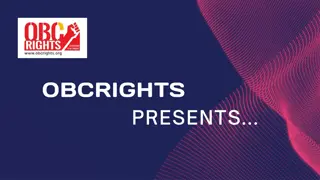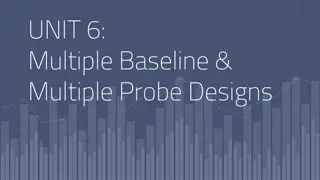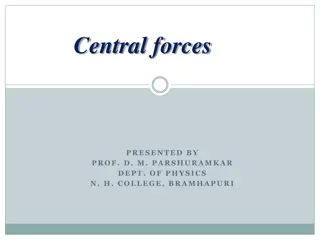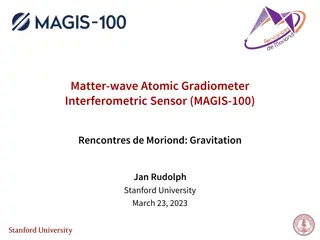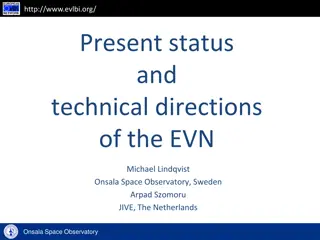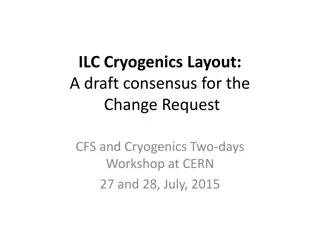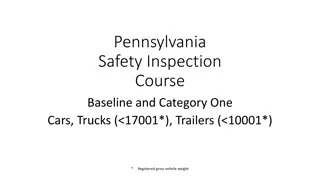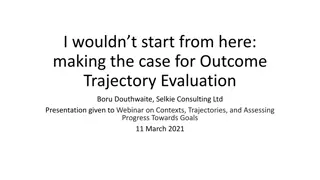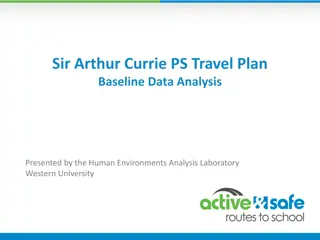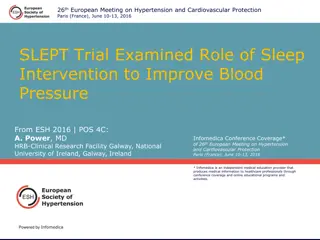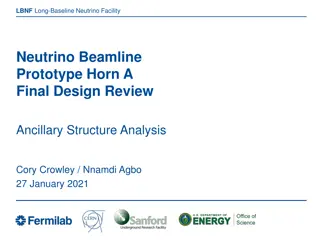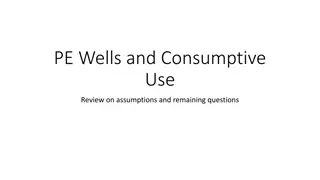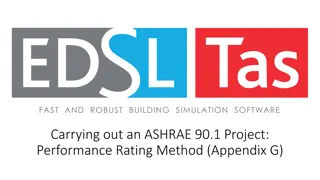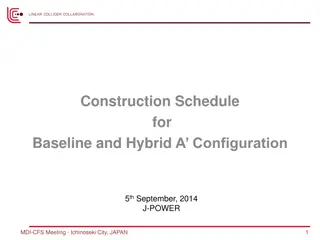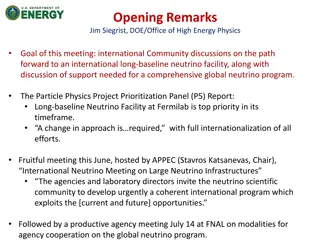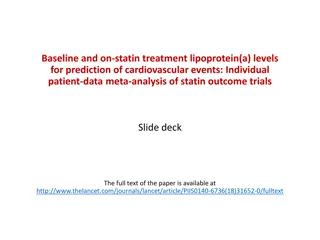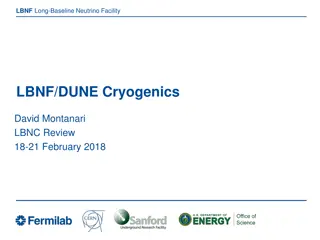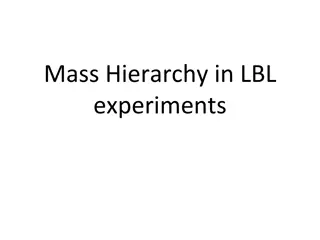
Outcome Assessment Procedures for Pediatric Cardiac Arrest Study
This document outlines the essential steps and procedures for assessing outcomes in pediatric cardiac arrest cases. It covers baseline assessment, caregiver identification, respondent support, establishing rapport, and evaluating global neurological and overall functioning. The focus is on collecting accurate data to analyze and understand the outcomes effectively.
Download Presentation

Please find below an Image/Link to download the presentation.
The content on the website is provided AS IS for your information and personal use only. It may not be sold, licensed, or shared on other websites without obtaining consent from the author. If you encounter any issues during the download, it is possible that the publisher has removed the file from their server.
You are allowed to download the files provided on this website for personal or commercial use, subject to the condition that they are used lawfully. All files are the property of their respective owners.
The content on the website is provided AS IS for your information and personal use only. It may not be sold, licensed, or shared on other websites without obtaining consent from the author.
E N D
Presentation Transcript
Baseline & Central-Measured Outcome Dr. Beth Slomine 2
Agenda Study Hospital responsibilities necessary for outcomes assessment for The first 48 hours 30 days or hospital discharge (whichever comes first) 2 and 11 months 3 and 12-month telephone interview 3
Baseline Assessment for Outcomes Understanding functioning prior to cardiac arrest is essential for outcome analysis Identify a primary caregiver as respondent Rate of global neurological functioning and overall functioning based on medical records and/or caregiver report Facilitate caregiver completion of 3 questionnaires Collect data within 48 hours of enrollment 4
Identifying and supporting respondent Respondent must be adult very familiar with everyday behavior of child (usually a parent). Identify obstacles: language, literary status, level of distress. Language - If proficiency in English comprehension is poor and Spanish is respondent s primary language, use Spanish version of questionnaires. Literacy - Must have sufficiently high reading skills to be able to read and understand questionnaires. If poor reading skills are suspected, read items to respondent. Distress - If the family is distraught, it is suggested that a member of the study team sit down with the respondent, and, if necessary, read questionnaires and assist with completion. 5
Establishing Rapport Establishing a relationship that encourages accurate, unbiased information is important for obtaining valid results. Take time to establish rapport: Briefly describe purpose of assessment: Learning about [NAME S] behavior and your family prior to this cardiac arrest will help us get a total picture of him/her Explain their role: Given that you have spent the most time with [NAME], you will be the important person who is going to give us the information about his/her behavior. Explain the structure of the questionnaires: You will be giving us information about [NAME S] physical, emotional, social, and cognitive functioning as well as information about his/her family and household. 6
Global Neurological and Overall Functioning PCPC Pediatric Cerebral Performance Category POPC Pediatric Overall Performance Category Review the medical record for the pre-CA level of impairment, medical conditions, AND etiology of delays in functional impairment. If records are not clear, ask the caregiver about any medical diagnoses the child had prior to the cardiac arrest AND ask whether each diagnosis limited child s functioning in any way. 7
PCPC/POPC Decision Tree Normal/Good = If the child has no disability or medical conditions, and is functioning appropriately, they should be classified as Normal on the PCPC and Good on the POPC. Mild Disability = If the child has minor delays or functional impairments and most skills are within age- appropriate limits, or the child has well-controlled medical conditions, they should be classified as Mild Disability . Moderate Disability = If the child is significantly delayed or functionally impaired in most areas and demonstrates some level of independence in activities of daily living, they should be classified as Moderate Disability . Severe Disability = If the child is responsive to the environment but dependent on others for daily support because of impaired brain functioning or other medical conditions (excluding age), the child is classified as Severe Disability . 1. 2. 3. 4. Coma/Vegetative State = If the child has any degree of coma, is unaware and unresponsive, even if awake in appearance, without interaction with environment, they are classified as Coma/Vegetative State . 5. 8
PCPC/POPC Decision Tree Neurological Disease is coded on the PCPC and the POPC. If the identified functional impairments are the result of neurological disease (e.g. cerebral palsy), the PCPC and POPC get coded based on level of functional impairments. If non-neurological medical conditions (e.g., asthma, amputation) impair functioning above and beyond any impairment caused by neurological disease, score disability ONLY on the POPC. 9
3 Baseline Questionnaires These questionnaires are to be answered by a primary caregiver about the subject s function PRIOR to cardiac arrest. Answers to these questions become less accurate with time. 1. Family and Household Information Form 2. PedsQL 3. Participant Contact Form All these forms can be found in the P-ICECAP Toolbox and in WebDCU
1. Family and Household Information Form RC will hand the caregiver the user-friendly printed form for completion. If necessary, RC will sit with family and assist with completion. The completed form should be entered directly into WebDCU . 11
2. PedsQL Appropriate PedsQL form is based on the age of the child on the day the form is completed. Verify date of birth, date of administration and determine exact age, do not round up, in order to choose the appropriate form. From the options below, pick only one Infant Scales PedsQL Infant Scales (2 days 12 months) PedsQL Infant Scales (13 months - < 2 years) OR Generic Core Scales PedsQL Generic Core Toddler Version (2-4 years) PedsQL Generic Core Child Version (5-7 years) PedsQL Generic Core Child Version (8-12 years) PedsQL Generic Core Teen Version (13-18 years) 12
2. PedsQL RC will hand caregiver the age-appropriate printed form. If necessary, RC will sit with family and assist with completion. The appropriate PedsQL form should be uploaded to the UofM secure dropbox so that Kennedy Krieger can score the measure and enter scores into WebDCU . 13
3. Baseline Participant Contact Form Study Hospital will obtain contact information from caregiver. Study Hospital should ask caregiver for all available contact information and alternates who can either complete the interview OR find a caregiver. Obtain names, telephone numbers, email, preferred contact method, time of day for interview and preferred language of primary caregiver. Keep this form at the Study Hospital.
Baseline Assessment Data Entry The Study Hospital will: Enter Baseline PCPC/POPC in WebDCU Enter Family and Household Information into WebDCU Upload PedsQL to secure UofM box for Kennedy Krieger to review and score Store Participant Contact Form at the Study Hospital Kennedy Krieger will: Enter PedsQL scores into WebDCU If these forms are not completed within 72 hrs of enrollment, an email reminder will be sent to Study Hospital 15
Hospital Discharge or 30 days Assessments (Whichever comes first) PCPC/POPC score at time of Hospital Discharge or 30 days, whichever comes first, is required PCPC/POPC should be completed from information available in medical record or by consulting care team as close to Hospital Discharge/Day 30 as possible, or from family interview (within 24 hrs of Hospital Discharge/Day 30) Refer to PCPC/POPC Decision Tree while reviewing records for information about development and functional skills at time of discharge or 30 days 16
3 Month Follow-Up: What is included? There is ONE component to the 3-month evaluation - 3-month telephone interview done by Kennedy Krieger 3-month data will be used for interim analyses and to add in adaptive allocation to cooling doses; collecting the VABS-3 in 3-month survivors is essential for trial success. Kennedy Krieger has 3 months 2 weeks to complete the 3 months assessment, thus it is important that the Study Hospital contact the family as soon as possible within the window (two to four weeks) prior to the 3-month date. 17
2 months after cardiac arrest In preparation for the 3-month outcome Pre-interview instruction for Study Hospitals 2-4 weeks prior to 3-month evaluation, contact caregiver to obtain vital status and if alive, update contact information. The Study Hospital can schedule interview time directly with caregiver. Please let caregiver know to expect interview will take between 30 minutes and up to 1.5 hours. 18
2 months after cardiac arrest In preparation for the 3-month outcome Pre-interview instruction for Study Hospitals All attempts to contact family at 2 months must be documented on Contact Tracking Form There is no minimum or maximum number of contacts prescribed. If Study Hospital is having trouble reaching the family, please reach out to Beth Slomine (Slomine@kennedykrieger.org) and Nishta Amin (aminN@kennedykrieger.org) and/or Moni Weber (monij@umich.edu) for advice and suggestions. 19
2 months after cardiac arrest In preparation for the 3-month outcome For Subjects Who Are Living The UPDATED Participant Contact Form should be uploaded to secure UofM dropbox. To ensure that form has been received the Study Hospital should ALSO email Dr. Beth Slomine at Slomine@kennedykrieger.org and Nishta Amin at AminN@kennedykireger.org to confirm receipt. It is critical the subject ID/date of birth are entered correctly on form so that Kennedy Krieger enters information for the correct participant into WebDCU . 20
2 months after cardiac arrest In preparation for the 3-month outcome For Subjects Who Are Deceased If the subject died between hospital discharge and the 3-month evaluation time point, DO NOT forward contact information to Kennedy Krieger. Kennedy Krieger will only be contacting caregivers of participants who survived. Study Hospitals must complete the End of Study Form in WebDCU . 21
2 months after cardiac arrest In preparation for the 3-month outcome For Subjects Lost to Follow-Up Discuss difficulties connecting with local PI and Beth Slomine and/or Moni Weber If suggestions exhausted, participant will be considered lost to follow-up for the 3-month visit. The participant will still be considered active and attempts should be made to contact the caregiver at 11 months. 22
12-Month Follow-Up: What is included? There are TWO components to the 12-month evaluation. 12-month telephone interview done by Kennedy Krieger On site 12-month Neurologic Evaluation, completed at the Study Hospital by a clinical neurologist. The primary outcome is VABS-3 Mortality Composite at 12 months collected via telephone interview Collecting VABS-3 in 12-month survivors is essential for trial success and should be completed PRIOR to the onsite neurological examination Kennedy Krieger has 12 months 2 weeks to complete the 12 months assessment Contact caregiver as soon as possible within window (2-4 weeks prior to 11-month date). 1. 2. 23
11 months after cardiac arrest In preparation for the 12-month outcome Pre-interview instruction for Study Hospitals 2-4 weeks prior to 3-month evaluation, contact caregiver to obtain vital status and if alive, update contact information. The Study Hospital can schedule interview time directly with caregiver. Please let caregiver know (remind caregiver) to expect interview will take between 30 minutes and up to 1.5 hours. 24
11 months after cardiac arrest In preparation for the 12-month outcome Pre-interview instruction for Study Hospitals All attempts to contact family at 11 months must be documented on Contact Tracking Form There is no minimum or maximum number of contacts prescribed. If Study Hospital is having trouble reaching the family, please reach out to Beth Slomine (Slomine@kennedykrieger.org) and Nishta Amin (aminN@kennedykrieger.org) and/or Moni Weber (monij@umich.edu) for advice and suggestions. 25
11 months after cardiac arrest In preparation for the 12-month outcome For Subjects Who Are Living 11-month Participant Contact Form will be uploaded to the secure UofM dropbox. To ensure that form has been received. Study Hospital should ALSO email Dr. Beth Slomine at Slomine@kennedykrieger.org and Nishta Amin at AminN@kennedykrieger.org to confirm receipt. It is critical the subject ID/Date of Birth are entered correctly on the contact form so that Kennedy Krieger enters information for the correct participant into WebDCU . 26
11 months after cardiac arrest In preparation for the 12-month outcome For Subjects Who Are Deceased If the participant died between hospital discharge and 12-month evaluation time point, DO NOT forward contact information to Kennedy Krieger. Kennedy Krieger will only be contacting families of known survivors. Study Hospitals must complete the End of Study Form in WebDCU . 27
11-month Procedures In preparation for the 12-month outcome For Subjects Lost to Follow-Up Discuss difficulties connecting with local PI and Beth Slomine and/or Moni Weber If suggestions exhausted, participant will be considered lost to follow-up for the 12-month visit. Study Hospital will complete the End of Study Form in WebDCU , indicating that the 12-month assessment was not done and when queried will explain that the family could not be contacted. 28
12-month Onsite Neurologic Evaluation Instructions for Study Hospitals prior to administration The neurologic examination must be completed AFTER the 12-Month Kennedy Krieger Evaluation. Schedule the Month 12 Neurologic Evaluation. Remind the participant/caregiver of the appointment at the time of contact for the 12- month evaluation and discuss site specific reimbursement policies for travel costs with the caregiver. Provide a paper copy of the correct neurologic exam form to the neurologist. There are two versions of the form (< 3 years of age, 3 years of age at the time of evaluation) 29
12-month Onsite Neurologic Evaluation Instructions for Study Hospitals after administration Collect Neurology Exam Form as soon as possible after exam completion. A copy should be retained by neurologist. Ensure all elements of Global Assessment Score are complete and ask neurologist to provide any missing or unclear information. Enter information from Neurology Exam Form directly into WebDCU . Retain Neurology Exam Form with research files. Upload a copy to secure UofM dropbox for review by Drs. Silverstein or Ichord. Drs. Silverstein/Ichord will reach out to site neurologists if there are questions or concerns. If necessary, site neurologist will correct form and site RC will revise WebDCU entries. Once the Neurology Exam is completed, complete the End of Study CRF. 30
What will we do with these outcomes? Vineland Adaptive Behavior Scale (VABS-3) at 12 months is highest priority VABS-3 Mortality Composite at 12 months is the primary outcome Pre-CA PCPC scores used to determine if child will be included in primary analysis Other measures are important for planned secondary analyses 31
VABS-3 Adaptive Behavior Composite Communication Daily Living Skills Socialization Motor Skills 32
Health-related Quality of Life PedsQL child functioning Infant Scales or Core Cognitive functioning PedsQL Family Impact Module caregiver and family functioning Parent functioning Family functioning 33
PCPC/POPC Brief Interview Captures diagnoses/medical problems AND functional impairments associated with each diagnosis/problem 34
3-month telephone interview Measure Vineland Adaptive Behavior Scale Third Edition (VABS-3) Domain Neurobehavioral Functioning Collection Method Caregiver interview via phone Time 30-60 min Health Related Quality of Life Caregiver report via phone 3-5 min PedsQL Core or Infant Scales Cognitive Functioning Caregiver report via phone 1-3 min PedsQL cognitive functioning Family Burden Caregiver report via phone 1 min PedsQL Family Impact Module (family functioning scales only) Neurological and global functioning Caregiver report (based on VABS-3 responses and any clarifying questions) 2-5 min PCPC/POPC 35
12-month telephone interview Measure Domain Collection Method Time VABS-3 Primary study outcome Neurobehavioral Functioning Caregiver interview via phone 30-60 min PedsQL Core or Infant Scales Health Related Quality of Life Caregiver report via phone 3-5 min PedsQL cognitive functioning Cognitive Functioning Caregiver report via phone 1-3 min PedsQL Family Impact Module (entire scale) Family Burden Caregiver report via phone 3-5 min PCPC/POPC Neurological and global functioning Caregiver report (based on VABS-3 and any clarifying questions) 0-5 min 36
Before Sites Go Live Discuss scientific rationale for study and potential impact study could have on patient population. Emphasize consequences of lost to follow-up on primary outcome. Orient study teams to detailed protocol and procedures. Many additional strategies (Gildea et la., 2020, supplemental table 1) 38
Thank you for your attention! Questions and Discussion 39

